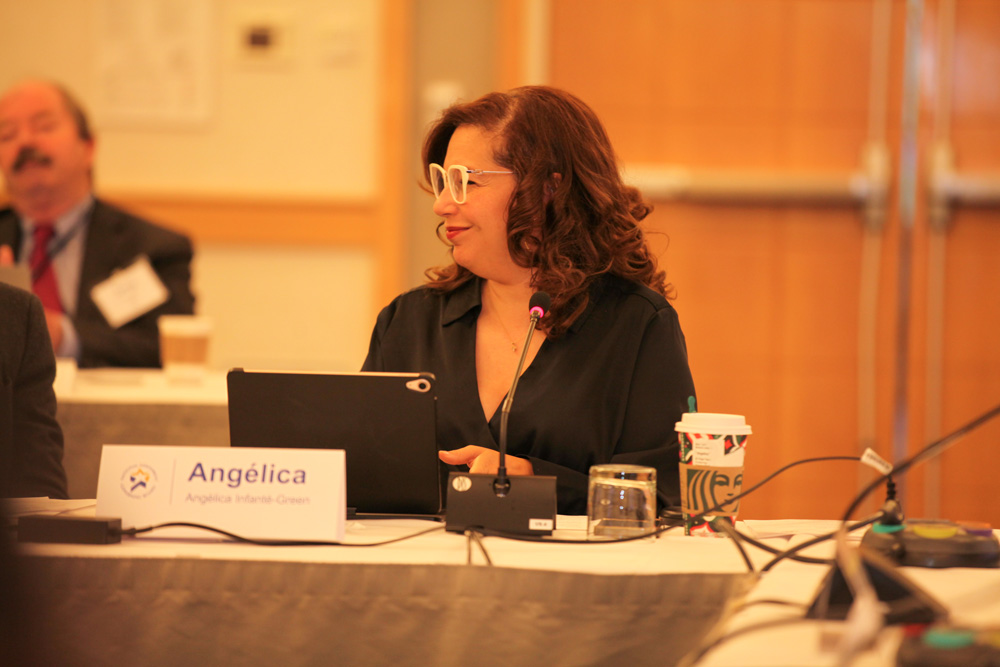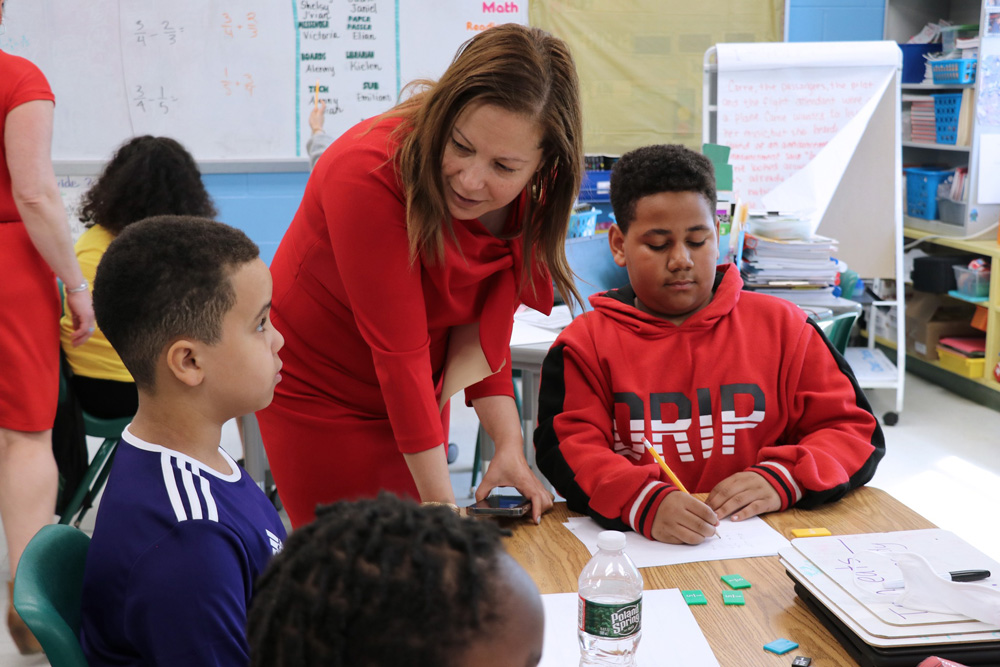Rhode Island Ed Chief Infante-Green on Charter Schools, Enrollment Loss and Providence’s Future
Facing halting improvement and potential closures in Providence, the state chief warned of the dangers of ‘sliding backwards.’

Get stories like this delivered straight to your inbox. Sign up for The 74 Newsletter
After five years in charge of Rhode Island’s largest district, state education Commissioner Angélica Infante-Green will soon decide whether Providence schools have made enough headway to be released from state control.
She’s called on a Massachusetts-based consulting firm, SchoolWorks, to lead an independent review of the system. Based on the deplorable condition of many schools and the “exceptionally low bar” for instruction found by Johns Hopkins University researchers in 2019, the district needed extensive work. But it has made some positive strides, slowed somewhat by the pandemic.
“What we don’t want is some of the progress that has been made to slide backwards,” she told The 74.
Providence has also seen a sharp decline in enrollment since the state took over — an almost 17% drop, according to a December report from a state policy organization.
Like most communities, Providence faces resistance to closing or consolidating schools. Its school board opposed Infante-Green’s move to merge 360 High School with another school on the same site. Opened in 2015 with help from a $3 million grant from the Carnegie Corporation, 360 High offers students a smaller, more personalized learning environment. Families sued over the closure, saying it would violate the right to language services of the many English learners who attend.
But Infante-Green, herself an English learner who began her career as a bilingual educator in New York City, said students at the school are missing out on critical programs that can prepare them for college.
“This school did not give kids AP courses. It’s not accredited,” she said. After the merger, they’ll have access to honors classes and the opportunity to take college courses.
The state of the district is one of numerous issues Infante-Green is navigating at home as she takes on a more prominent role nationally. In October, U.S. Secretary of Education Miguel Cardona appointed her to the National Assessment Governing Board, which oversees the collection of tests known as the Nation’s Report Card,

Scott Marion, another member of the board and director of the nonprofit Center for Assessment, said state and local education leaders bring a practical outlook that researchers and testing experts sometimes lack.
“We absolutely need chiefs like Angélica on NAGB,” he said. “In many ways, they’re one of the prime audiences we hope use NAEP results.”
Infante-Green sought help from Marion’s center in 2021 to better understand the extent of pandemic learning loss. Her department spent relief funds on mid-year tests at a time when statewide assessments were canceled. Those snapshots of students’ learning allowed researchers to map how long it might take students to get back on grade level.
“We had that data in real time,” she told The 74, “and we were able to figure out what kind of support we needed to put in place.”
In a wide-ranging interview with The 74, Infante-Green also discussed the state’s efforts to wean districts off federal relief funds and measure the additional money’s impact.
This interview has been edited for length and clarity.
You’re among the state superintendents who began their tenure before the pandemic. What kind of perspective does that give you on recovery?
The leaders that were here before the pandemic, during the pandemic and are still here — and there aren’t too many of us — we do see a couple of things. One is the way that we were able to pivot and do things in such short fashion. That tells us the possibility of what we can do moving forward. I think that is really exciting. We have also seen how tired people are. I have to think about how we support people, how we do our work differently, how we innovate.
With relief funds, we were able to pay for interim assessments so we could have data at the state level. We met with superintendents, and we talked about the areas that we really needed to focus on. Everybody thought it was going to be the older grades, but it was really the younger kids that were impacted, and we had that data in real time.

Speaking of data, the Education Recovery Scorecard from Harvard and Stanford universities gives us a district-level view of how students are doing that we don’t get from the National Assessment of Educational Progress or from the Trial Urban District Assessment, which has only 27 districts. Do you see more collaboration between NAEP and researchers in the future to do that work?
I do see more opportunities. We’re all in a place where we think that the things that we’ve done have made an impact, but we haven’t really done the research nationwide to pinpoint that exactly. We know that tutoring has helped.
We see the benefit of kids having more hours. In Providence in particular, we negotiated with the teachers union to get an extra 30 minutes a day, which is an extra 15 days a year. Gov. Dan McKee also has this program called Learn 365, where mayors open centers so kids can go there after school, Saturdays, even Sundays. We’re not even calling it remedial. It’s about really doubling down on the things that they need.
I wanted to shift to one of the biggest topics on everyone’s mind, the expiration of federal relief funds and the so-called fiscal cliff. Do you expect to apply for an extension?
I don’t foresee us applying for it. Our districts have been doing a good job of getting the kids the support that they need. But I am going to be the number one advocate for continued funding. I know that there’s no appetite for it in Washington, but there has to be.
“I am going to be the number one advocate for continued funding. I know that there’s no appetite for it in Washington.”
State Education Commissioner Angélica Infante-Green
Inline pullquote: “I am going to be the number one advocate for continued funding. I know that there’s no appetite for it in Washington.”
Our math scores are back to where they were pre-pandemic, but we don’t think that’s where we should be. We should be moving forward. We want to continue to make progress. It almost seems unfair that now we’re just going to say, “OK we see these things work, we’ve seen results and now we’re just gonna take it away.”
How is Rhode Island preparing, and what concerns you?
The birth rate is down. We knew that was coming. Across the nation, they’re closing school buildings, laying off employees. We held districts harmless for two years with their enrollment loss. And this is the first year that they’re going to get 40% of funding for each student they lost. Then the second year they’re going to get 25% of that funding so there isn’t just a cliff.
Where’s that money going to come from?
It’s coming from the state, and I hope it continues. There is this desire to have a gradual decline as opposed to the money just going away. It’s not just the expiration of relief funds. It’s also the decline in population.
How much of a cushion is that for districts?
It’s not going to be much, unfortunately. They are going to have to get rid of staff. Many of them have coaches that will probably be gone. I think the mental health positions are going to be gone, which is really worrisome. These positions really helped kids transition back into school.
Inline pullquote: “They are going to have to get rid of staff. Many of them have coaches that will probably be gone. I think the mental health positions are going to be gone, which is really worrisome.”
We’ll lose not just positions, but support. Tutoring after school is going to be very difficult to do. For Providence, those extra 30 minutes are going to go away. All the districts are going to have a deficit.
What has the state done to try to measure the impact of those funds?
We know how much districts received, how they spent their money and if they had tutoring. We try to tie the tutoring to actual results. For example, Providence ran spring academies last year and this year — at a time when schools are usually closed in February and in April. And let me tell you, the kids showed up. They still need the support, academically. We have something called the Right to Read Act [which requires teachers to be trained in the science of reading]. By 2025, our K-8 teachers will all be trained, but we’re at about 75 percent. Some are in their second year. We can track the kids that have been with them to see what’s worked.
We’re going to have limited funds. What are we going to invest in? What are we going to really keep our eye on?

You mentioned some specific efforts in Providence, and I know a lot of families there are anxious for different reasons. Families worry about school closures. Others are trying to get into charters, but there isn’t enough space. What do you say to families in traditional schools as well as those on waiting lists for charters?
I believe in families having the ability to be in the best school for their kid, whether that be our traditional schools or our charters. I’ve been pretty clear on that. What’s interesting about Providence is that about 19,000 children apply to charter schools and there are only 22,000 students in the district. So they want charter schools. But my role in this intervention is also to ensure that the existing schools are high-quality. That may feel uncomfortable for certain people.
Inline pullquote: “What’s interesting about Providence is that about 19,000 children apply to charter schools and there are only 22,000 students in the district. So they want charter schools.”
Last year, we closed down two schools [Lauro and Feinstein elementary schools]. With Feinstein, we fixed the roof three times and it continued to leak. And there was a sewer leak in the basement. It was awful. Nobody should have been in that building. The other building, it kept raining inside. Teachers had buckets by the windows to collect rain. It costs a lot of money to heat and run those schools. We have to start making decisions for the district that are fiscally and educationally sound.
Nobody really likes change, but we have to think about the district as a whole. It’s happening nationwide.
At the same time, you have to think about the demand for seats in charter schools. Stop the Wait RI, a charter advocacy group, says there were 31,000 applications for charter schools for next school year, an increase over 2023-24 of more than 3,000.
These schools that we’ve closed down, we don’t own the buildings. The mayor owns the buildings. Charters are welcome to apply for buildings that have been taken offline.
Charter schools go through a rigorous application process. We had expansions, so the numbers will be growing, but it will be the same providers at this point.
Finally, what needs to happen for Providence schools to return to local control?
We said that in 2024, we’d look at how much progress has been made. But when that was decided in 2019, nobody anticipated a pandemic. There are things that have to be true — whether it’s structurally sound, whether the board is ready to take it back, whether the city is fiscally able to support the district.
What we don’t want is some of the progress that has been made to slide backwards.
Get stories like these delivered straight to your inbox. Sign up for The 74 Newsletter

;)
